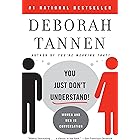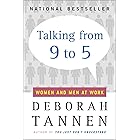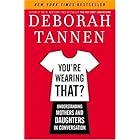| Print List Price: | $20.00 |
| Kindle Price: | $4.99 Save $15.01 (75%) |
| Sold by: | Random House LLC Price set by seller. |
Your Memberships & Subscriptions

Download the free Kindle app and start reading Kindle books instantly on your smartphone, tablet, or computer - no Kindle device required.
Read instantly on your browser with Kindle for Web.
Using your mobile phone camera - scan the code below and download the Kindle app.



 Audible sample
Audible sample The Argument Culture: Stopping America's War of Words Kindle Edition
The Argument Culture is about a pervasive warlike atmosphere that makes us approach anything we need to accomplish as a fight between two opposing sides. The argument culture urges us to regard the world--and the people in it--in an adversarial frame of mind. It rests on the assumption that opposition is the best way to get anything done: The best way to explore an idea is to set up a debate; the best way to cover the news is to find spokespeople who express the most extreme, polarized views and present them as "both sides"; the best way to settle disputes is litigation that pits one party against the other; the best way to begin an essay is to oppose someone; and the best way to show you're really thinking is to criticize and attack.
Sometimes these approaches work well, but often they create more problems than they solve. Our public encounters have become more and more like having an argument with a spouse: You're not trying to understand what the other person is saying; you're just trying to win the argument. But just as spouses have to learn ways of settling differences without inflicting real damage on each other, so we, as a society, have to find constructive and creative ways of resolving disputes and differences. Public discussions require making an argument for a point of view, not having an argument--as in having a fight.
The war on drugs, the war on cancer, the battle of the sexes, politicians' turf battles--in the argument culture, war metaphors pervade our talk and shape our thinking. Tannen shows how deeply entrenched this cultural tendency is, the forms it takes, and how it affects us every day--sometimes in useful ways, but often causing, rather than avoiding, damage. In the argument culture, the quality of information we receive is compromised, and our spirits are corroded by living in an atmosphere of unrelenting contention.
Tannen explores the roots of the argument culture, the role played by gender, and how other cultures suggest alternative ways to negotiate disagreement and mediate conflicts--and make things better, in public and in private, wherever people are trying to resolve differences and get things done. The Argument Culture is a remarkable book that will change forever the way you perceive the world. You will listen to our public voices in a whole new way.
- LanguageEnglish
- PublisherBallantine Books
- Publication dateOctober 24, 2012
- File size3675 KB
Customers who bought this item also bought
Editorial Reviews
Amazon.com Review
From Publishers Weekly
Copyright 1998 Reed Business Information, Inc.
From Library Journal
Copyright 1997 Reed Business Information, Inc.
From Booklist
From Kirkus Reviews
Review
Because Tannen believes we basically agree with one another, she wishes public life would rely less on fights and more on experts.... besides her strangely un-American attachment to mediation, what Tannen is missing is that conflict is fun. We love fighting for its own sake, even when one side is obviously wrong. -- The New York Times Book Review, Larissa MacFarquhar
From the Inside Flap
The Argument Culture is about a pervasive warlike atmosphere that makes us approach anything we need to accomplish as a fight between two opposing sides. The argument culture urges us to regard the world--and the people in it--in an adversarial frame of mind. It rests on the assumption that opposition is the best way to get anything done: The best way to explore an idea is to set
From the Back Cover
--The Washingtonian
Praise for You Just Don't Understand:
"Utterly fascinating . . . a classic in the field of interpersonal relationships."
--San Francisco Chronicle
"People are telling Tannen that the book is saving their marriages. . . . You Just Don't Understand goes a long way toward explaining why perfectly wonderful men and women behave in ways that baffle their partners."
--The Washington Post
"Tannen's provocative book, remarkable for its accessibility amid all the complexities it explores, is sure to make people talk, and to give us hope in our struggle to be heard and understood."
--Mirabella
"Aside from the vivid examples and lively prose, what makes this book particularly engaging is that the author makes linguistics interesting and usable."
--The New York Times Book Review
"Tannen has a marvelous ear for the way real people express themselves and a scientist's command of inner structures of speech and human relationships."
--Los Angeles Times
"Deborah Tannen combines a novelist's ear for the way people speak with a rare power of original analysis."
--Oliver Sacks
Praise for Talking from 9 to 5:
"A book that everyone who has ever apologized needlessly, snapped at a subordinate, or withered from lack of praise should surely read."
--The New York Times
"Her most intriguing work."
--The Boston Globe
Praise for That's Not What I Meant:
"We are, all of us, foreigners to each other: editor and writer, man and woman, Californian and New Yorker, friend and friend. Dr. Tannen shows us how different we are and how to speak the same language."
--Jack Rosenthal, Pulitzer Prize winner and editor-in-chief, The New York Times Magazine
"Offers intriguing insights into where we go wrong with language--and how our problems get started."
--Mademoiselle
About the Author
Excerpt. © Reprinted by permission. All rights reserved.
FIGHTING FOR OUR LIVES
This is not another book about civility. “Civility” suggests a superficial, pinky-in-the-air veneer of politeness spread thin over human relations like a layer of marmalade over toast. This book is about a pervasive warlike atmosphere that makes us approach public dialogue, and just about anything we need to accomplish, as if it were a fight. It is a tendency in Western culture in general, and in the United States in particular, that has a long history and a deep, thick, and farranging root system. It has served us well in many ways but in recent years has become so exaggerated that it is getting in the way of solving our problems. Our spirits are corroded by living in an atmosphere of unrelenting contention—an argument culture.
The argument culture urges us to approach the world—and the people in it—in an adversarial frame of mind. It rests on the assumption that opposition is the best way to get anything done: The best way to discuss an idea is to set up a debate; the best way to cover news is to find spokespeople who express the most extreme, polarized views and present them as “both sides”; the best way to settle disputes is litigation that pits one party against the other; the best way to begin an essay is to attack someone; and the best way to show you’re really thinking is to criticize.
Our public interactions have become more and more like having an argument with a spouse. Conflict can’t be avoided in our public lives any more than we can avoid conflict with people we love. One of the great strengths of our society is that we can express these conflicts openly. But just as spouses have to learn ways of settling their differences without inflicting real damage on each other, so we, as a society, have to find constructive ways of resolving disputes and differences. Public discourse requires making an argument for a point of view, not having an argument—as in having a fight.
The war on drugs, the war on cancer, the battle of the sexes, politicians’ turf battles—in the argument culture, war metaphors pervade our talk and shape our thinking. Nearly everything is framed as a battle or game in which winning or losing is the main concern. These all have their uses and their place, but they are not the only way—and often not the best way—to understand and approach our world. Conflict and opposition are as necessary as cooperation and agreement, but the scale is off balance, with conflict and opposition overweighted. In this book, I show how deeply entrenched the argument culture is, the forms it takes, and how it affects us every day—sometimes in useful ways, but often creating more problems than it solves, causing rather than avoiding damage. As a sociolinguist, a social scientist, I am trained to observe and explain language and its role in human relations, and that is my biggest job here. But I will also point toward other ways for us to talk to each other and get things done in our public lives.
THE BATTLE OF THE SEXES
My interest in the topic of opposition in public discourse intensified in the years following the publication of You Just Don’t Understand, my book about communication between women and men. In the first year I appeared on many television and radio shows and was interviewed for many print articles in newspapers and magazines. For the most part, that coverage was extremely fair, and I was—and remain—indebted to the many journalists who found my ideas interesting enough to make them known to viewers, listeners, and readers. But from time to time—more often than I expected—I encountered producers who insisted on setting up a television show as a fight (either between the host and me or between another guest and me) and print journalists who made multiple phone calls to my colleagues, trying to find someone who would criticize my work. This got me thinking about what kind of information comes across on shows and in articles that take this approach, compared to those that approach topics in other ways.
At the same time, my experience of the academic world that had long been my intellectual home began to change. For the most part, other scholars, like most journalists, were welcoming and respectful in their responses to my work, even if they disagreed on specific points or had alternative views to suggest. But about a year after You Just Don’t Understand became a best-seller—the wheels of academia grind more slowly than those of the popular press—I began reading attacks on my work that completely misrepresented it. I had been in academia for over fifteen years by then, and had valued my interaction with other researchers as one of the greatest rewards of academic life. Why, I wondered, would someone represent me as having said things I had never said or as having failed to say things I had said?
The answer crystallized when I put the question to a writer who I felt had misrepresented my work: “Why do you need to make others wrong for you to be right?” Her response: “It’s an argument!” Aha, I thought, that explains it. When you’re having an argument with someone, your goal is not to listen and understand. Instead, you use every tactic you can think of—including distorting what your opponent just said—in order to win the argument.
Not only the level of attention You Just Don’t Understand received but, even more, the subject of women and men, triggered the tendency to polarize. This tendency to stage a fight on television or in print was posited on the conviction that opposition leads to truth. Sometimes it does. But the trouble is, sometimes it doesn’t. I was asked at the start of more than one talk show or print interview, “What is the most controversial thing about your book?” Opposition does not lead to truth when the most controversial thing is not the most important.
The conviction that opposition leads to truth can tempt not only members of the press but just about anyone seeking to attract an audience to frame discussions as a fight between irreconcilable opposites. Even the Smithsonian Institution, to celebrate its 150th anniversary, sponsored a series of talks billed as debates. They invited me to take part in one titled “The Battle of the Sexes.” The organizer preempted my objection: “I know you won’t be happy with this title, but we want to get people interested.” This is one of many assumptions I question in this book: Is it necessary to frame an interchange as a battle to get people interested? And even if doing so succeeds in capturing attention, does it risk dampening interest in the long run, as audiences weary of the din and begin to hunger for more substance?
From AudioFile
Product details
- ASIN : B009JU5GCY
- Publisher : Ballantine Books (October 24, 2012)
- Publication date : October 24, 2012
- Language : English
- File size : 3675 KB
- Text-to-Speech : Enabled
- Screen Reader : Supported
- Enhanced typesetting : Enabled
- X-Ray : Not Enabled
- Word Wise : Enabled
- Print length : 384 pages
- Best Sellers Rank: #400,017 in Kindle Store (See Top 100 in Kindle Store)
- #67 in Social Customs & Traditions
- #79 in Social Sciences Reference
- #317 in Cultural Anthropology (Kindle Store)
- Customer Reviews:
About the author

Deborah Tannen is the author of You Just Don't Understand, which was on the New York Times bestseller list for nearly four years including eight months as #1, and has been translated into 31 languages. Her books You're Wearing THAT?: Understanding Mothers and Daughters in Conversation and You Were Always Mom's Favorite!: Sisters in Conversation Throughout Their Lives were also New York Times bestsellers. Talking from 9 to 5: Women and Men at Work was a New York Times business best seller; I Only Say This Because I Love You: Talking to Your Parents, Partner, Sibs and Kids When You're All Adults won the Books for a Better Life Award; and The Argument Culture: Stopping America's War of Words received the Common Ground Book Award. Her most recent book is Finding My Father: His Century-Long Journey from World War I Warsaw and My Quest to Follow. She has written for and been featured in newspapers and magazines such as The New York Times, The Wall Street Journal, The Washington Post, USA Today, Time, and Newsweek. She appears frequently on TV and radio, including such shows as The Colbert Report, 20/20, The Oprah Winfrey Show, Nightline, Today, Good Morning America, and NPR's Morning Edition and All Things Considered. She is University Professor and Professor of Linguistics at Georgetown University, and has been McGraw Distinguished Lecturer at Princeton University. She lives with her husband in the Washington, D.C., area.
Customer reviews
Customer Reviews, including Product Star Ratings help customers to learn more about the product and decide whether it is the right product for them.
To calculate the overall star rating and percentage breakdown by star, we don’t use a simple average. Instead, our system considers things like how recent a review is and if the reviewer bought the item on Amazon. It also analyzed reviews to verify trustworthiness.
Learn more how customers reviews work on AmazonTop reviews from the United States
There was a problem filtering reviews right now. Please try again later.
- Reviewed in the United States on July 22, 2015After reading Deborah's book I am much more aware of the aggressive combative language in our culture and the media. I feel less like a victim of it all. She helps you rise above it and see a better path. I vote for Deborah Tannen for President!
- Reviewed in the United States on December 5, 2009I wish this book could made required reading for everyone who listens to the media, watches TV news, votes, raises a family, or expresses an opinion. Tannen explains a large part of why our nation is in so many messes we are unable to deal with intelligently. She absolutely nails the problem. You'll never look at things the same way again.
- Reviewed in the United States on April 8, 2019Written during the tumultuous Clinton years, this book describes the climate of argument that seemed to prevail in many levels of society at that time from politics to the media to education.
The author describes this climate of argument and attempts to analyze some of the reasons for it. She doesn’t go so far as to suggest that all argument in all situations is bad. There are some areas where arguments are part of the necessary function of an aspect of society, such as the legal system. But she suggests that the level of hostility even in these areas may have gotten out of hand.
She also tries to look for ways of cutting down on this level of hostility even where it is not possible to eliminate it altogether, such as paying attention to how other cultures manage life in these areas. Or consider having a dialogue rather than a debate or argument. Not every idea needs to be a winner-take-all proposition.
I wonder how this book would be different if it were written today. I no longer follow politics or the news media closely enough to know if some of the practices referred to are still followed there, but from what I do see in these areas, I get the impression that things are worse than ever there. And many of the other areas she discusses seem to be getting worse rather than better as well.
- Reviewed in the United States on August 4, 2019It is very apt for our times, in terms of the constant hostile dialogue that is so pervasive.
- Reviewed in the United States on August 30, 2015Received it in just a few short days from ordering it. Such a great read!!!!
- Reviewed in the United States on December 31, 2003The premise of this book matches an observation I had come up with on my own -- that intelligent debate, or just letting people be has been replaced on a cultural level with persistent and ubiquitous climate of belligerant and puerile namecalling. Thus when I heard about this book I was really excited and wanted to learn all abut Ms. Tannen's insights and thoughts on this matter.
I was sorely disappointed. This book is not what it purports to be.
Most of the book is a longwinded rant about how Republicans are evil and must be stopped, unlike the Democrats who are as pure as the snow.
Among Ms. Tannen's various swipes, she lashes out at people who oppose abortion as hateful rights-stealers, people who question whether there is a scientific basis for abortion as ignorant doofuses, etc etc. It just goes on and on.
If you are looking to read a book by a leftist who hates the right with a passion, this is the book for you.
If you are looking for an intelligent and thoughtful analysis of the problem of antagonistic debate, this book does not provide it.
- Reviewed in the United States on June 22, 2015Quality book in fine condition delivered in a timely way. Thanks.
- Reviewed in the United States on February 27, 2014I think this book is timely for these days when we hear terribly inept and abusive arguments on every TV channel. It is time someone pointed out the underlying divisive nature of modern American argument. It does nothing for our culture, and in fact destroys it piece by piece. Tannen takes on all these issues one by one with fair evidence and a convincing view. I used this book to teach Argument Writing and my students did not enjoy some of the chapters feeling that there was a bias on her part to find fault with so much. But I think it is because the students are so young they have little exposure to real arguments where people understand basic fairness, follow certain rules (i.e. no fallacies), are reasonable, and are willing to listen to both sides of a debate. Therefore, I feel the book did a good job of exposing them to the inequities, biases, and sheer ignorance of many of the arguments we are bombarded with today. If for nothing else, this made it a good book for young people to read. Where else can they be aware of the fallacies and breaches of logic that are blasting at them from the media on a daily basis? Thumbs up Deborah!
Top reviews from other countries
 freesia mayReviewed in the United Kingdom on September 12, 2015
freesia mayReviewed in the United Kingdom on September 12, 20155.0 out of 5 stars Five Stars
brilliant book. very useful











